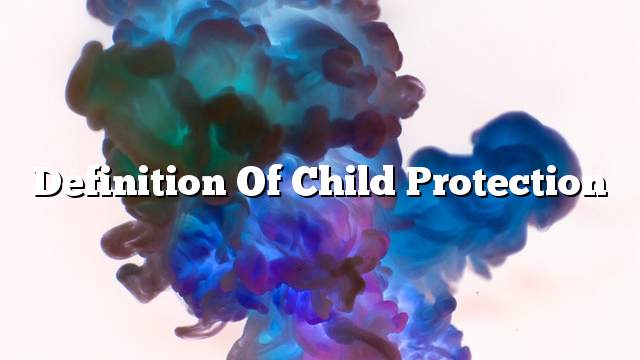Child Protection
Child protection is a set of measures and frameworks that prevent child abuse, exploitation and neglect, as well as violence that affects the child’s psyche, as stipulated in the United Nations Convention on the Rights of the Child, all human rights conventions and national laws in force.
International conventions for the protection of children
- The International Labor Organization (IOL) was concerned with the issue of child labor, in accordance with Conventions 182 and 138.
- The United Nations General Assembly adopted on 20 November 1959 the Declaration on the Rights of the Child when the Convention on the Rights of the Child was concluded.
- The United Nations Children’s Fund (UNICEF) provides long-term humanitarian and development assistance to children and mothers living in developing countries.
- The United Nations (UNO) agreed on the military exploitation of children.
Reasons for claiming child protection
Many of the world’s children have been exposed to many serious problems resulting from poverty, violence, humiliation, or working at an early age. The number of children suffering from injuries and distortions resulting from violence has increased, thus increasing the number of children from psychological crises, as well as children Who decided to flee their homes, which endangered the lives of many children of the world, while children under the age of 18 need special attention, so officials agreed in 1989 that children need to have their own agreement, which made the organization UNESCO is interested in protecting and protecting the Children, open and live abob them in order to have a decent life.
The most important rights for child protection
- The right of children to enjoy all their rights and to protect them from racial discrimination, whether on the basis of their skin color, descent, religion or social status.
- Provide all the factors that allow children to grow properly whether this growth is mind, or body.
- Provide the basic rights of the child, such as name, nationality or identity, so that the child can obtain his / her identity card in addition to his right to participate in the elections.
- Provide all social and health services needed by the child from housing, food and clothing.
- Care for children with disabilities and provide the health care they need.
- Ensure the right of children to education, which is free and compulsory, but not for all stages.
- Protect children from exploitation and provide the protection they need, both in terms of health and education.
- Raising children on love, affection, brotherhood, and tolerance.
- To provide love and a sense of safety for children, in addition to providing them with the necessary financial support to protect them from deprivation, and special care must be given to children living in harsh conditions that have caused their loss to their families.
